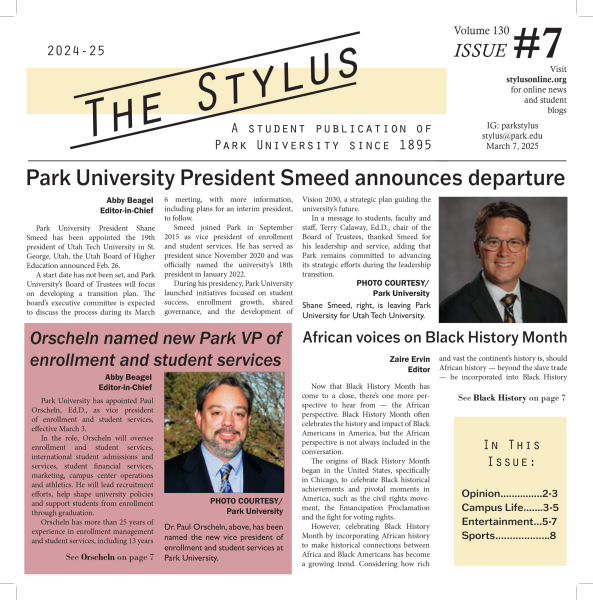Criminal Justice Department Offers Free Text Books
Textbooks are troublingly expensive. That’s not exactly a radical statement. According to the College Board, books and supplies will cost students at four-year institutions about $1,250. However, finding solutions to this trouble requires assessing and addressing a wide range of concerns. Of solving problems, former President Franklin D. Roosevelt said, “take a method and try it. If it fails, admit it, and try another. But above all, try something.”
This fall, Park University tried something. It was the first semester of the Park University Zero Textbook Cost Pilot Program. There’s a website for the program that can be found through Park’s home page where qualifying students can apply. It extends to all undergraduate military students; so that’s Active Duty, Active Duty Dependent, Reservist and National Guard members, or anyone else receiving the $250 per credit hour tuition rate. Any student who meets this qualification and is majoring in Criminal Justice is eligible. They can receive access to class materials online without having to purchase textbooks.
Why criminal justice? The program was chosen because it has the largest number of military students.
John Hamilton, Ph.D., is chair of the criminal justice department. He addressed the distinction between online class materials and textbook. His first and most emphatic point was the room for flexibility and problem solving this program presents.
“Every course can have a book; the point was not to force instructors to change their lessons, but to find options for students,” Hamilton said.
For example, from a cost saving perspective, an e-book is an excellent choice and was used in some cases. However, if a professor or student preferred the advantages offered by a physical book, the program looked for a loose-leaf, unbound copy of the book to save money that way. In other cases, the choice of a traditional textbook remained. In this line of questions, he rejected the idea of a departmental turn away from traditional books entirely. Hamilton listed off audio books, self-published books and deals with vendors as just a few of dozens of options besides e-books that aren’t often considered.
“The university isn’t looking to save money at the cost of education,” Hamilton said.
This flexible process was the point of putting the program into practice on a small but measurable scale to begin with. When the plan was first proposed by President Greg Gunderson, it was slightly larger and included the business department. Its current incarnation was selected to provide a large, but clearly defined and measurable sample size.
Jeff Uhrlich, Ph. D, was able to provide some of those numbers. Of the about 200 potential students who qualified for the program, 115 accessed it. Any e-text books required were paid for by the program. If an e-text was not available, the program paid for the traditional book. The total cost this semester was around five thousand dollars. Surveys were sent to participating students but have not been analyzed yet, but classes with entirely e-text materials had a ten percent higher retention rate, notes Uhrlich. The purpose of this careful scrutiny is the key to the larger goal.
“We would like to see something like this available to all students in the future,” said Hamilton.
Whether that future program involves a flat tuition payment for books, a simplified required book selection allowing for deals with book dealers to save money, or an as yet unforeseen possibility, the goal remains simple and the same; to reduce book costs and make college more affordable for every student.
In that spirit, the process has yielded one unexpected benefit already. This pilot program, proposed by the school’s president, has passed through a wide variety of departments and campuses. It has involved the administration, faculty senate and honor students. It has taken efforts from the IT department, financial offices, Academic Affairs, the Warrior Center and others. In all this, Hamilton sees a true spirit of participation which, he observes with a laugh, has not always been there.
“We’re still searching for the right answers but everyone has been working together to get them; the answer isn’t simply, no,” Hamilton said.
Your donation will support the student journalists of Park University. Your contribution will allow us to cover our annual website hosting costs, freeing up other funds for equipment, printing and training.








